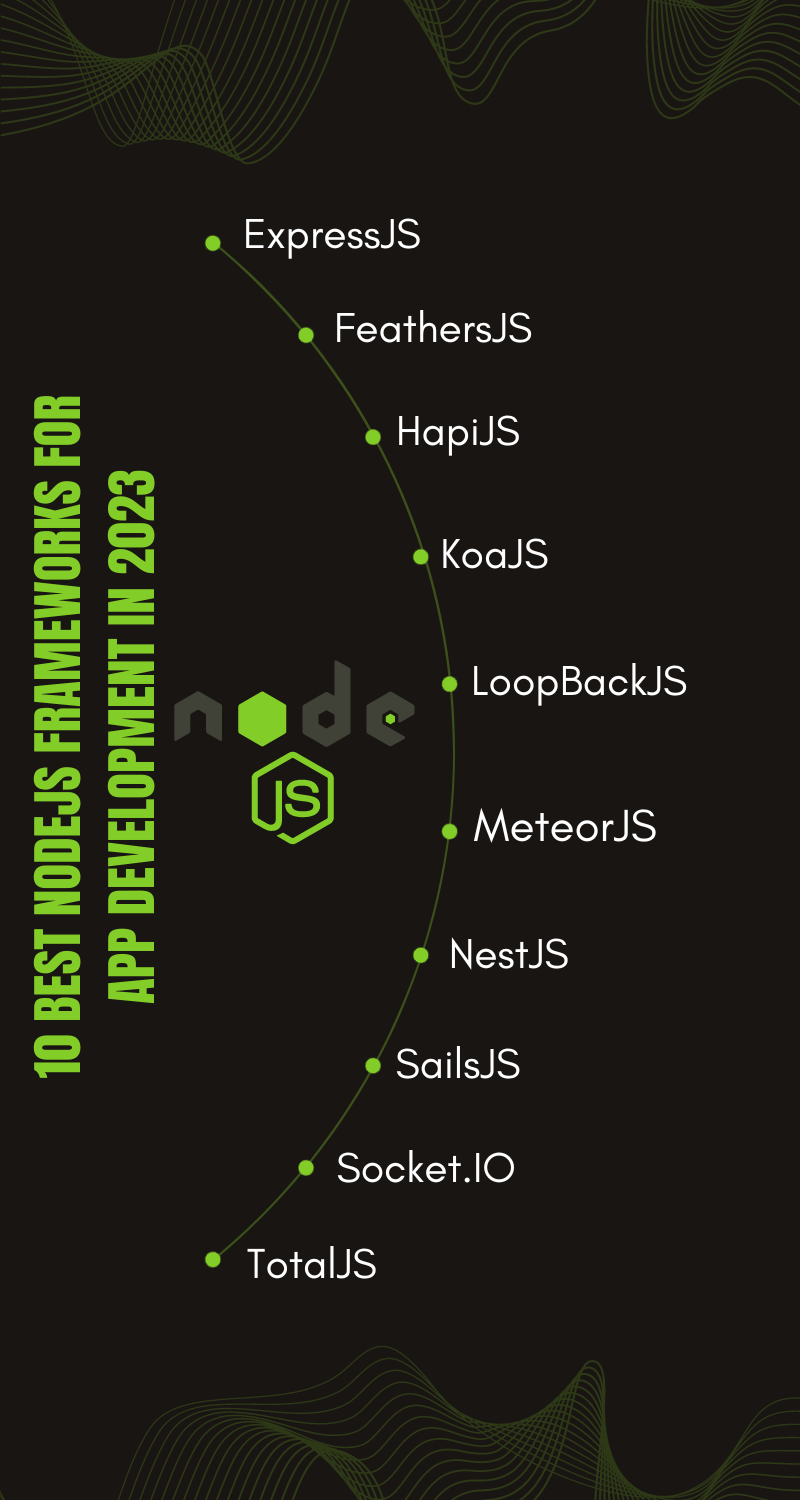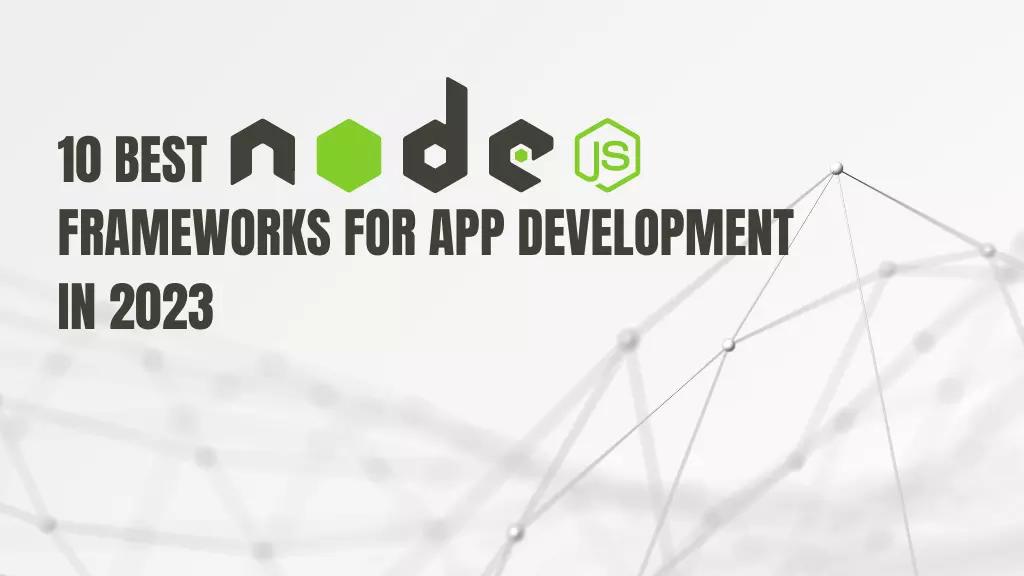Top 10 NodeJS Frameworks for App Development in 2023. According to reports on Statista, NodeJS is widely preferred by developers worldwide as of 2022, making it very popular in the software industry. And as NodeJS is on the rise, it has also catered to the boost in some of the best NodeJS frameworks for app development.
Businesses have made it large using the NodeJS frameworks in their applications which has helped them ensure scalability, flexibility, security, and other essential aspects of the application.
But what are these frameworks?
Top 10 NodeJS Frameworks for App Development in 2023
So, below is a list of some of the top 10 best frameworks you can consider using in 2023 to develop top-notch applications for your business.
-
Express.js
-
Feathers.js
-
Hapi.js
-
Koa.js
-
LoopBack.js
-
Meteor.js
-
Nest.js
-
Sails.js
-
Socket.IO
-
Total.js
Express.js
It is an open-source back-end web app framework in Javascript that helps build RESTful APIs with Node.js. It has a fast, robust, and asynchronous architecture and helps develop single, multi-page, and hybrid web apps.
Its key features are -
-
It has an easy learning curve with a basic understanding of NodeJS.
-
It streamlines client-to-server requests and also has a robust routing mechanism.
-
It highly focuses on performance and has high test coverage.
-
In addition, it integrates well with SQL and NoSQL databases and supports multiple template engines.
Feathers.js
It is a full-stack web framework that helps develop API and real-time applications for TypeScript and JavaScript in Node.js. It is fast, lightweight, universal, flexible, and customizable and helps develop robust and lightweight applications.
Read: Best Practices for Node.js Security
Some of its features include the following -
-
It works well with front-end technologies like Angular, ReactJS, React Native, and VueJS.
-
It has flexible plugins and also supports multiple databases.
-
It helps simplify the development of service-oriented solutions.
-
It also allows the reusability of services and helps build production-ready apps.
Hapi.js
It is a simple, secure framework that helps develop robust and scalable applications with minimal overhead. It is one of the best NodeJS frameworks for creating proxy servers, REST APIs, and web applications.
Read: Why Choose NodeJS For IoT Applications
The key features are -
-
It has many built-in plugins that eliminate the need for third-party middleware.
-
It facilitates fast and easy debugging alongside high scalability.
-
Hapi is lightweight, has an easy learning curve, and is compatible with MySQL, MongoDB, and many other databases.
-
In addition, it has zero routing conflicts and has an integrated authorization and authentication feature.
Koa.js
Also known as the lighter version of ExpressJS, it was also developed by the same team as Express. KoaJS is an open-source, powerful, and flexible next-generation web framework that helps build APIs quickly and efficiently.
Its primary features are -
-
It is customizable, lightweight, and has a robust code management system.
-
Its upstream and downstream flow of controls helps make synchronous programming simple.
-
It helps in preventing website crashes and also personalizes the user experience.

LoopBack.js
It is an open-source, flexible, and highly extensible NodeJS framework that helps build powerful APIs and microservices. In addition, it offers better connectivity, helps reduce development time, and helps convert web applications to mobile apps alongside a well-structured codebase.
The features of Loopback are -
-
It supports databases like MySQL, Oracle, MongoDB, PostgreSQL, and others.
-
It has an in-built client API explorer and modules and supports OpenAPI.
-
It also facilitates CLI with API management and enables the creation of dynamic and end-to-end REST APIs.
Meteor.js
It is a free, open-source, cross-platform, isomorphic framework that the industry giants like Ikea, Qualcomm, and many others use. It allows seamless data transfer between the client and the server. Also, it enables rapid prototyping with the command-line interface (CLI).
Some of the features include the following -
-
It is lightweight and easily integrates with frameworks like Vue and Angular.
-
It facilitates smart packages and numerous libraries alongside a live reloading feature and easy deployment capabilities.
-
It has enormous community support with developers worldwide.
Nest.js
It is an open-source and versatile progressive Node.js framework that helps develop efficient, reliable, scalable server-side applications. It has a vast library collection that helps develop multi-layered enterprise apps. It allows developers to streamline their workflow along with increased productivity.
Its features are -
-
It integrates well with ExpressJS and is easy to learn and use.
-
It has a vast developer community and a robust Command-line Interface (CLI) that eases the software development process.
-
In addition, it also has rich documentation and enables Object-Oriented Programming (OOP), Functional Reactive Programming, and Functional Programming.
Sails.js
It is a real-time MVC framework for NodeJS that helps create RES APIs and single-page applications. It easily integrates with Node Package Manager (NPM) and other Javascript frameworks. It is also compatible with multiple databases, which helps develop high-end and complex web apps.
Its features are -
-
It supports multiple data stores and real-time WebSockets and also has reusable security policies.
-
It is well-documented and helps in developing apps with minimal writing of code.
-
Object Relational Mapping (ORM) helps provide a simple data access layer to use any database.
Socket.IO
It is a Javascript library that helps create real-time web apps and conducts real-time communication through open connections in both directions. It helps speed up the development process and ensures accuracy while providing a seamless user experience.
The features of Socket.IO are -
-
It enables binary support between the client and the server.
-
It is reliable and also supports auto-reconnection and multiplexing.
-
It provides real-time analytics and facilitates automatic error detection and correction.
Total.js
It is a full-fledged open-source Javascript platform that helps provide a CMS-like experience in a Node.js environment. In addition, it has no dependencies and over 300 UI components that help develop super-fast applications with low maintenance costs.
Its features are -
-
It is compatible with multiple databases and easily integrates with numerous front-end frameworks.
-
It enables real-time tracking and file merging and facilitates seamless API testing.
-
It has an active community and also enables rapid development.
Wrapping It Up
There are numerous frameworks that NodeJS caters to businesses and developers. And now that you have the list of some of the best NodeJS frameworks, you can consider using them while developing software for business.
So, why wait?
Hire a developer or a development company and consider the frameworks mentioned above to build high-performing, top-notch, and secure web applications for your business.
FAQs
What are the advantages of using NodeJS?
-
The benefits of using NodeJS are -
-
It runs on Google’s V8 engine, compiling the functions into machine code, making it fast and effective.
-
Its event-driven architecture helps in developing robust applications.
-
It has a widespread community of developers worldwide.
-
It also supports cross-platform development, and
-
It helps develop web apps efficiently with NPM (Node Package Manager).
-
What are the companies that use NodeJS in their applications?
-
Some companies that use NodeJS are LinkedIn, Netflix, Uber, Trello, PayPal, NASA, eBay, Medium, and many others.
Is there a future for NodeJS?
-
NodeJS is a javascript runtime environment, and Javascript is one of the most used programming languages. However, businesses and developers still prefer using NodeJS for developing software because of its robustness and scalability, making way for NodeJS to grow in the future.

